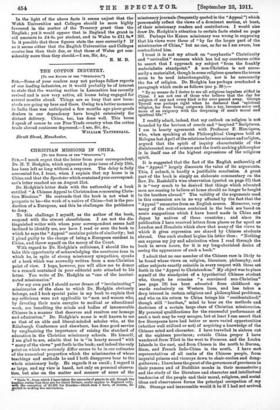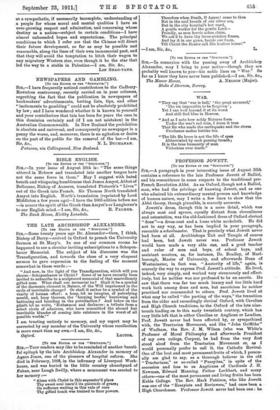CHRISTIAN MISSIONS IN CHINA.
[To THE EDITOR or THE " SPBCTATOR."1 SIR,—I much regret that the letter from your correspondent, Dr. H. T. Hodgkin, which appeared in your issue of July 15th, has been left so long without a response. The delay is fully accounted for, I trust, when I explain that my home is in China and that the Spectator which contained your correspond- ent's letter reached me on August 21st.
Dr. Hodgkin's letter deals with the authorship of a book entitled " A Chinese Appeal to Christendom concerning Chris- tian Missions." He contends that the book is not what it purports to be—the work of a native of China—but is the pro- duction of a European, and this he challenges the publishers to deny.
To this challenge I myself, as the author of the book, respond with the utmost cheerfulness. I am not the dis- tinguished writer with whom your correspondent seems half inclined to identify me, nor have I read or seen the book to which he says the "Appeal" contains points of similarity ; but I plead guilty to the charge of being a European resident in China, and throw myself on the mercy of the Court.
With regard to Dr. Hodgkin's criticisms, I should like to take this opportunity of acknowledging the courteous tone in which he, in spite of strong missionary sympathies, speaks of a book which was avowedly written from a non-Christian point of view. I hope, however, you will allow me to demur to a remark contained in your editorial note attached to his letter. You write of Dr. Hodgkin as "one of the incrimi- nated missionaries."
For my own part I should never dream of " incriminating " missionaries of the class to which Dr. Hodgkin obviously belongs, and I took special pains in my book to explain that my criticisms were not applicable to "men and women who, by devoting their main energies to medical or educational work, are benefiting the minds and bodies of innumerable Chinese in a manner that deserves and receives our homage and admiration." Dr. Hodgkin's name is well known to me as that of an able and liberal-minded scholar who, at the Edinburgh Conference and elsewhere, has done good service by emphasizing the importance of raising the standard of education in the Christian missionary schools. He himself, I am glad to see, admits that be is "in hearty accord" with " many of the views" put forth in the book; and indeed the only point on which we seriously differ seems to be in our estimates of the numerical proportion which the missionaries of whose teachings and methods he and I both disapprove bear to the whole missionary body. He regards it as small ; I regard it as large, and my view is based, not only on personal observa- tion, but also on the matter and manner of some of the
• Table V., from which I have taken the amounts of grants in aid, though the heading states that they are for Great Britain, really applies to England only, with the exception of £1,000 for Dundee—which sum I hare, of course, de- 4ucted. in =Wring the calculation.
missionary journals (frequently quoted in the "Appeal") which presumably reflect the views of a dominant section, at least, of their missionary readers and contributors. I would also draw Dr. Hodgkin's attention to certain facts stated on page 301. Perhaps the Xansu missionary was wrong in supposing that his views were those of "by far the larger part of the missionaries of China," but no one, so far as I am aware, has contradicted him.
I trust it is not my attack on "corybantic " Christianity and "revivalist" excesses which has led my courteous critic to assert that I approach my subject "from the frankly materialistic standpoint." A non-Christian is not neces- sarily a materialist, though in some religious quarters the terms seem to be used interchangeably, nor is be necessarily the foe of religion. Dr. Hodgkin has perhaps overlooked a paragraph which reads as follows (see p. 38 ):---
" By no means do I desire to see all religions impulses stifled in China. I am not one of those who believe that the day for religion of any and every kind is for ever passed away. George Tyrrell was perhaps right when he declared that spiritual religion, far from being outgrown like a toy, becomes more and, more of an exigency with the deepening of man's moral and spiritual life.' "
I readily admit, indeed, that my outlook on religion is not bounded by the horizon of creeds and " inspired " Scriptures. I am in hearty agreement with Professor F. Henriques,
who, when speaking at the Philosophical Congress held at Bologna last April of the relations between science and religion,
argued that the spirit of inquiry characteristic of the disinterested man of science and the truth-seeking philosopher is in itself one of the highest expressions of the religious spirit.
It is suggested that the fact of the English authorship of the " Appeal " largely discounts the value of its arguments. This, I submit, is hardly a justifiable conclusion. A great part of the book is simply an elaborate commentary on the Rev. Dr. Rashdall's wise observation (quoted on page 33) that it is "very much to be desired that things which educated men are ceasing to believe at home should no longer be taught to the heathen abroad." The validity of the arguments used in this connexion are in no way affected by the fact that the " Appeal " emanates from an English source. Moreover, very many of the criticisms contained in the book are based on acute suggestions which I have heard made in China and Japan by natives of those countries ; and since its publication I have received letters from places as far apart as London and Honolulu which show that many of the views to which it gives expression are shared by Chinese students abroad. One such student begins his letter thus : " Nothing can express my joy and admiration when I read through the book in seven hours, for it is my long-cherished desire of seeing the appearance of such a book."
I admit that no one member of the Chinese race is likely to be found whose views on religion, literature, philosophy, and other subjects exactly coincide in every respect with those set forth in the "Appeal to Christendom." My object was to place myself at the standpoint of a hypothetical Chinese student who, though be remains "a convinced non-Christian" (see page 19) has been educated from childhood up- wards exclusively on Western lines, and has taken a deep interest in certain religious and philosophical problems, and who on his return to China brings his " occidentalized," though still "heathen," mind to bear on the methods and doctrines of a certain large class of Christian missionaries. My personal qualifications for the successful performance of such a task may be very meagre, but at least I can assert that few Europeans have had better or more varied opportunities (whether well utilized or not) of acquiring a knowledge of the Chinese mind and character. I have travelled in sixteen out of the eighteen provinces; outside China proper I have wandered from Tibet in the west to Formosa and the Luchu Islands in the east, and from Chosen in the north to Burma, Siam, and French Indo-China in the south. I have met representatives of all ranks of the Chinese people, from imperial princes and viceroys down to chair-coolies and dung- gatherers ; I have been the guest of the governors of provinces in their yamens and of Buddhist monks in their monasteries ; and the study of the literature and character and intellectual tendencies of the people and their moral, religious, and social ideas and observances forms the principal occupation of my life. Strange and inexcusable would it be if I had not arrived at a sympathetic, if necessarily incomplete, understanding of a people for whose moral and mental qualities I have an ever-growing respect and admiration, and concerning whose destiny as a nation—subject to certain conditions—I have almost unbounded hopes and expectations. The principal conditions to which I refer are that the Chinese will direct their future development, so far as may be possible and reasonable, along the lines of their own immemorial past, and that they will avoid the temptation to hitch their wagon to any migratory Western star, even though it be the star that led the way to a stable in Palestine.—I am, Sir, &c.,
LIN SHAO-YANG.







































 Previous page
Previous page